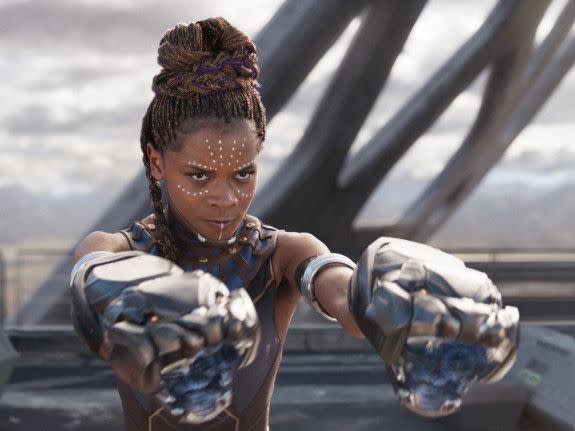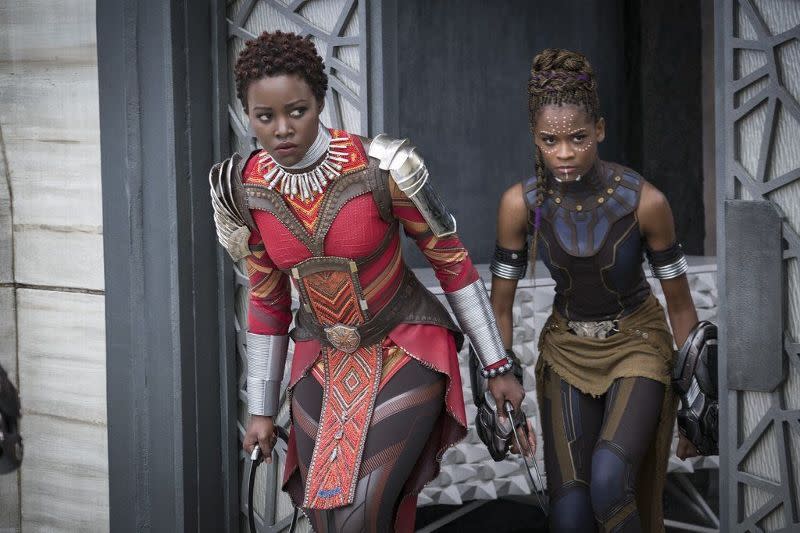'Black Panther' is a Huge Win for Women

This post contains SPOILERS for Black Panther.
Black Panther is groundbreaking in a multitude of ways. It’s a massive step forward for black representation in film, it’s changing what a superhero movie can accomplish, and it’s smashing through box office records like T’challa smashes through gangsters in a South Korean casino. In addition to these accomplishments, however, there’s also the salient fact that Black Panther successfully gives female characters depth and range on the same level of its male heroes and villains. Black Panther as a movie and as a character cannot exist without the women of Wakanda, and the overarching message is one that is rarely seen in the superhero genre (or in many movies in general): Women Get Shit Done, Discount Them At Your Own Risk.
To start, there are more main female characters in Black Panther than there are in any other currently released MCU film. While it’s true that all of them support King T’challa in some way (Ramonda is his mother, Shuri his sister, Okoye his general, Nakia a spy, and the rest of the Dora Milaje are his guards), they never come off as existing solely for T’challa’s benefit. Everyone has their own thing going on, whether it’s being a super-genius with a taste for shoe puns, freeing young girls from assumed sexual slavery (which, by the way, wow), maintaining a regal front in the face of chaos, or making hard choices when it comes to dueling loyalties, the women in T’challa’s life are busy, interesting people.

Aside from the women in Black Panther being well-rounded individuals, they also save T’challa’s entire ass in the third act of the movie. Sure, it’s M’baku who keeps T’challa on ice, but it’s Nakia’s act of bravery in stealing the heart-shaped herb from Killmonger and Ramonda’s negotiating that allows him to return to his rightful place. It’s the Dora Milaje rallying for their king that turns the tide on the battle against the Border Tribe and Killmonger’s men (it’s also Okoye who shuts the Border Tribe leader W’kabi down for thinking that her love for him was more important that her loyalty to Wakanda. Boy, bye). There’s also Shuri, who comes through with her panther gauntlets and her remote piloting technology that allows Everett Ross to take down the vibranium shipment. Nothing in this movie happens without women, and having their contributions carry the film to its conclusion is important and praiseworthy.
Contrast the women in T’challa’s life with those in Killmonger’s. He straight up executes his lover once he doesn’t need her hacking skills anymore and is actively disrespectful to the Queen Mother. He chokes one of the women monks who guard the heart-shaped herb. He takes the Dora Milaje for granted and does nothing to earn or inspire their loyalty. If T’challa’s outlook on women is “these are the important people in my life, without whom I am nothing” Killmonger’s is “I am a toxic masculine nightmare and women will never matter to me, ever.” It’s his fatal flaw. He underestimates how resourceful Wakanda’s women are and it comes back to bite him somewhere between his third and fourth rib. This is not to discount T’challa’s heroism or the grass-skirt-wearing badassery of M’baku’s Jabari army, but it does say that the difference between victory and defeat in the world of Black Panther is the strength and effort of black women. What a delightful take!

There are further things Black Panther could have done to create a completely representative women’s world. There were rumors that the movie would include a romance between the Dora Milaje general Okoye and Ayo, the Dora played by Florence Kasumba whose character in the comic books is canonically gay. Their relationship was platonic in the movie, which felt like a misstep for a film so dedicated to giving black women their full due. Still, there are more stories to be told in Wakanda and there may be hope that future films will give queer women some badly-needed representation in the MCU (in the meanwhile, Ayo’s love story can be found in Roxane Gay’s World of Wakanda). It’s important to keep pushing for the types of characters people want to see on screen, and Black Panther has done great work in giving the world a cast of crucial black women whose lives are full and whose actions define the narrative. Hopefully its historic success will get the hint across to filmmakers in all genres.
Follow Alexis on Twitter and Cosmo Celeb on Facebook.
You Might Also Like


